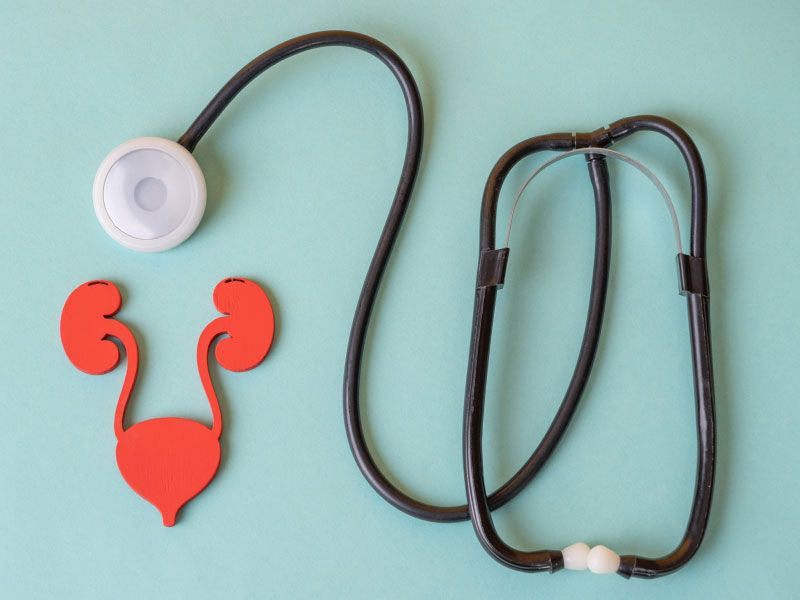
Written by Kathleen Morrison
Medically Reviewed by Andrea Sleeth WHNP-BC, MSCP
A little burning or extra bathroom trips might not seem like a big deal, but sometimes a UTI isn’t just a passing annoyance. While most clear up with the right prescription treatment, some can stick around or even spread—so it’s good to know when to check in with a provider.
Figuring out what’s normal and what’s not doesn’t have to be complicated. We’ll break down how UTIs happen, what symptoms to keep an eye on, and when it’s time to get some extra support. Because when you know what to look for, taking care of your body gets a whole lot easier.
What Causes a Serious UTI?
A urinary tract infection can range from a mild inconvenience to a serious health concern, depending on how it progresses and whether it receives prompt treatment. While most UTIs are easily treated with antibiotics, some can become severe, leading to complications such as kidney infections or even life-threatening sepsis. Some factors include:
- Untreated UTI
- Antibiotic-resistant bacteria
- Underlying health conditions
- Urinary blockages
What’s the Worst that Can Happen if a UTI Spreads?
The first stage of a UTI is a lower urinary tract infection. This is when the bacteria is in your urethra—the small tube that your pee exits through–or your bladder. After your bladder is infected, the bacteria can continue traveling up your system and cause an upper urinary tract infection. At this point, the UTI affects your ureters–the tubes that take your pee from your kidneys to your bladder—and your kidneys.
And once in your kidneys? That’s where bacteria can get even more dangerous and get into your bloodstream, potentially leading to sepsis. Diagnosing and treating a UTI with antibiotics as soon as possible is the best way to avoid these dangerous complications!
Wisp treatment options are available only after consultation with a licensed medical professional. You should consult with your healthcare provider before starting a new supplement or treatment regimen. Individual results may vary.
Signs of a Severe UTI
Most UTIs stick to the bladder, but if bacteria travel further up the urinary tract, things can get more intense. More severe UTI symptoms can include:
- Pain in the lower back or sides (near the kidneys) - could mean bacteria have traveled and caused a mild kidney infection
- Fever or chills - sign that your body is working overtime to fight the infection.
- Blood in the urine - is another clear sign that it’s time to check in with a healthcare provider.
- Feeling extremely weak, tired, or out of it - potentially due to the body’s immune response fighting the infection, potential dehydration, and the infection spreading to the kidneys or bloodstream
Some people also experience nausea or vomiting as their body struggles to contain the infection. In older adults, confusion or dizziness can appear if the infection spreads beyond the urinary tract. If any of these symptoms show up, don’t wait it out—getting prescription treatment ASAP can help you feel better fast.
How Much Time Should I Wait Before Treating a UTI?
If your UTI symptoms persist for more than 24 hours, the safest course of action is to contact a healthcare provider. UTI prescription treatments are available online and can keep your infection from spreading up your urinary system and causing serious (and potentially expensive) harm.
Why Quick Treatment Matters
Sadly, ignoring a UTI doesn’t make it go away. In fact, letting it linger could lead to bigger health issues like a kidney infection.
A kidney infection can be painful and sometimes require stronger treatment. Repeated infections can put extra stress on the kidneys, making it harder for them to function properly and even causing permanent kidney damage. In rare cases, an untreated UTI can lead to sepsis, a serious complication that affects the entire body.
For those with chronic conditions like diabetes or weakened immune systems, infections can be even harder to manage. Bottom line? If your symptoms are getting worse, don’t push through the discomfort. Quick treatment means faster relief and less stress.
How to Treat a Dangerous UTI
Treating a dangerous UTI requires prompt medical attention. Treatment can vary based on how severe the infection is, but the sooner you take action, the easier the recovery tends to be.
Prescription Treatments
Your healthcare provider may recommend antibiotics for a UTI, like nitrofurantoin or trimethoprim-sulfamethoxazole. These target the bacteria causing the infection, helping you feel better as quickly as possible. It’s super important to finish the entire course, even if you start feeling better—this helps make sure all the bacteria are cleared out so the infection doesn’t come back.
Everyone’s body is different, so some medications may work better for you than others. If you experience frequent UTIs, your provider might suggest a lower dose of antibiotics for an extended period or even a single dose after sex. Always check in with your provider to find what works best for you.
Natural Support and Lifestyle Tweaks for a Happier Urinary Tract
Some simple changes at home can help you support your urinary tract while your antibiotics work their magic.
Drinking lots of water helps flush everything out, and while cranberry juice is popular, the research on its effectiveness is a bit mixed. If you’re feeling discomfort, a warm compress on your lower abdomen can help ease cramping.
Cutting back on caffeine and sugary drinks can be helpful, as these might irritate your bladder.
Switching to breathable underwear and avoiding harsh soaps can also create a more comfortable environment while your body heals. Before trying any new remedies or supplements, make sure to check with your healthcare provider to see if they’re a good fit for you.
By combining small lifestyle changes with the right treatment, you’ll be back on track in no time.
When to Reach out to a Doctor
Sometimes, UTIs feel manageable, and a little extra water or rest can go a long way. But there are moments when it’s important to get some professional advice, especially if things start feeling different or more intense. Knowing when to reach out for help is key to making sure you get the care you need before anything becomes more complicated.
When to Seek Immediate Medical Attention
If you’re dealing with a high fever, sharp back pain, or difficulty keeping food or liquids down, it’s a good idea to get checked out by a provider. These could be signs that the infection has spread to other parts of your body, like your kidneys. If your symptoms come on strong or suddenly, don’t wait—head to a clinic or ER.
For older adults or people with existing health conditions, confusion or changes in behavior could mean the infection has advanced. Pregnant individuals should also stay alert, as UTIs can affect pregnancy. The sooner you get care, the sooner you can feel better and avoid any complications.
Follow-up Care and Monitoring your Recovery
Once you’ve started prescription UTI treatment, checking in with your healthcare provider is always a good idea. A follow-up test can confirm that the infection is fully cleared. If you tend to get UTIs often, more in-depth testing might be needed to dig a little deeper and figure out what’s going on.
Keeping track of your symptoms, how your body responds to treatment, and any potential triggers (like stress) helps your provider adjust your care plan if needed. Regular check-ins not only give you peace of mind but also support your long-term urinary health.
Taking Action and Staying Ahead of UTIs
Knowing when a UTI is serious can make all the difference. Listening to your body and noticing changes in comfort or bathroom habits is key to catching issues early and getting faster relief.
A mild sting or frequent urge to pee might seem like it’ll pass, but if you’re unsure, it’s always a good idea to check in with a healthcare provider. Wisp is here to offer judgment-free care that fits your busy life, so you can ask questions without hesitation.
There are plenty of ways to handle the situation, starting with prescription antibiotics and incorporating more healthy habits to support your body. Catching things early can help avoid bigger problems, and drinking more water and avoiding irritants can help, too, especially when paired with professional care.
No one wants an infection to get worse, so staying on top of things and seeking care early makes all the difference. Even if UTIs are a frequent issue, with the right plan and regular check-ins, you can feel more in control and less disrupted by symptoms. Proactive care helps you focus on what matters most—living your life with confidence.
Ready to take control of your urinary health? Wisp offers discreet, reliable care that’s always just a click away. If you’re experiencing UTI symptoms, don’t wait—reach out today for fast, personalized prescription treatment.
This blog post is for informational and educational purposes only and should not be taken as professional advice. Always consult with a qualified professional before making any decisions based on the information provided here.



